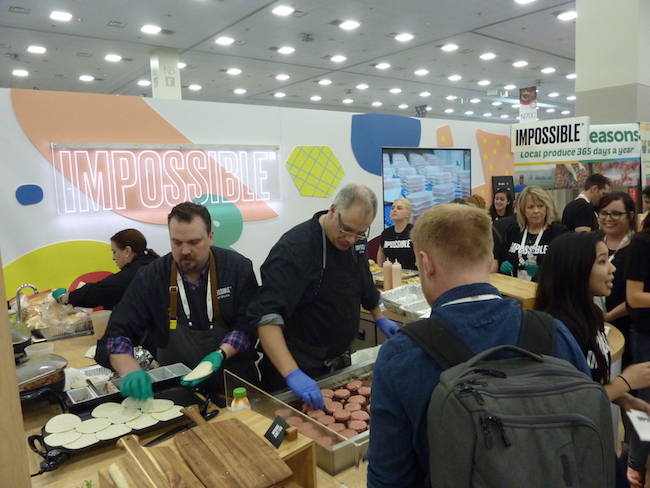
New Hope Network Believes GMO 2.0 Technologies Have a Place in the Natural Products Industry. How Will Organic Brands Respond?
Our Model: Organic Insider accepts no advertising, does not have a paywall and makes its newsletters free to everyone because vital information about the organic industry needs to get out to as many people as possible. Please consider supporting our work, whether you are an individual or a company. Thank you so much.
New Hope Network recently released a report called Food Tech in Natural Products: Precision Fermentation Market Risks and Readiness, a blatant attempt to justify its inclusion of GMO 2.0 foods (specifically, precision fermentation) at its Natural Products Expos.
Yet, buried on page 10 of its report, it was found that 92% of Natural Product Expo buyers do not believe that precision fermentation/GMO 2.0 technologies are “enabling positive product innovations that should be part of the natural products industry.”
This should have been enough to end the discussion and ban all GMO 2.0 foods at Natural Products Expo.
Instead, this report does the opposite.
It parses data and shows CEOs, marketers and product developers in the natural products industry how to effectively incorporate and utilize precision fermentation (GMO 2.0), despite the fact that New Hope fully acknowledges that “precision fermentation may not be natural.”
More than anything, this report is seeking to normalize precision fermentation (GMO 2.0), paving the way for its growing presence on trade show floors, on educational panels and in industry reports.
“Companies call these things ‘synthetic biology’ and ‘fermentation technology,’ but these foods are all just GMOs,” said Michael Hansen, PhD, senior staff scientist at Consumer Reports. “They are using terms people do not understand, so that people will not realize these are GMO ingredients.”
New Hope says that since its founding in 1975, it “has worked to steward a movement that began as a counter-culture challenge to the status quo in a food system that failed to prioritize human health,” a statement that would seem to put the organization at great odds with GMO 2.0 foods.
“These are often highly processed foods, which are associated with increased calorie intake and weight gain, according to a study from the National Institute of Health,” put forth Michael Hansen, PhD. “Also, these companies are introducing novel, genetically-engineered proteins into the food supply that will have unknown potential impacts on the human microbiome and the environment, and they are self-affirming GRAS status with the FDA, a voluntary process that is incredibly problematic and falls very, very short of protecting the consumer.”
THE POLAR OPPOSITE OF WHAT THE ORGANIC INDUSTRY REPRESENTS
For organic advocates, the anger and confusion of seeing GMO 2.0 foods at Natural Products Expo West began in 2019, when Impossible Foods served its genetically-engineered Impossible Burgers at its booth in the North Tower.

After the COVID hiatus, it further escalated at Natural Products Expo West 2022, when we were told during The State of Organic & Natural keynote presentation that “The only way we are going to meet demand, as a planet, is through cultured meat” — laboratory-grown meat or GMO 2.0 meat.
For those of us who have an unwavering commitment to organic, genetic engineering is not something that we view as innocuous and is anathema to everything we believe in.
GMOs and their corresponding pesticides have inflicted incalculable harm across the country, primarily through seed and pesticide drift.
In fact, the super-toxic herbicide dicamba has been so devastating that the U.S. Court of Appeals for the Ninth Circuit said the chemical has “torn apart the social fabric of many farming communities” due to the property damage caused by its spraying on genetically-engineered soybeans and the ensuing conflict between neighbors.
Aside from the visible damage GMOs have caused, the people inventing these technologies even have real doubts and concerns.
Caius Rommens, PhD, inventor of the GMO potato that uses RNAi gene silencing to prevent potatoes from bruising, said, “Consumers should understand that it is impossible for genetic engineers to understand all the consequences of a particular genetic modification. Some of these consequences are very indirect and may become apparent only after ten or twenty years. Genetic engineering is very risky, and it is akin to editing a book without understanding the language. Scientists engaging in such work are destined to make mistakes.”
A MUTUALLY BENEFICIAL RELATIONSHIP — UNTIL NOW
For decades, New Hope and the organic industry have both benefitted from a long-standing partnership in numerous ways.
Expo West and Expo East have served as critical meeting points for buyers, brands, suppliers and the press, and the organic industry would absolutely not be where it is today without these shows. New Hope has also helped champion organic and regenerative organic through its media channels, promotional platforms and educational panels.
Alternatively, organic companies annually spend many tens of millions on booths and promotional activities at New Hope trade shows, and the organic industry has played an absolutely pivotal role in helping it grow into a massive business that has come to dominate the U.S. organic trade show landscape.
New Hope claims that its “primary goal is to be of service to the natural and organic products industry.”
Yet, given everything presented in its new report, it is reasonable to question whether that is, in fact, still the case.
Organic brands need to ask themselves if they want to direct their hard-earned marketing dollars to an organization that so openly embraces genetic engineering and to share trade show floor space with companies that represent an existential threat to their business.
——
To read New Hope’s letter to the natural products industry, click HERE.
To read New Hope’s report Food Tech in Natural Products: Precision Fermentation Market Risks and Readiness, click HERE.
 (Are these the type of companies that organic brands want to share trade show floor space with?)
(Are these the type of companies that organic brands want to share trade show floor space with?)
 |
With gratitude, 
Max Goldberg, Founder |
Quick Hits
* Terra Thread has launched its first collection of Regenerative Organic Certified™ cotton wardrobe staples.
* An organic, plant-based omakase bar and sushi restaurant opened in Los Angeles.
* Thrive Market has been awarded TRUE Gold Certification for Zero Waste at its Pennsylvania fulfillment center.
* How Mad Agriculture is supporting farmers to build a more regenerative future.
* Why apple cider vinegar fans are mad at Katy Perry.
* Richman Law & Policy, which works with many organic and non-GMO groups, has released its 2022 Impact Statement.
* How a 31-year-old organic farmer eats on a $30K annual salary in Newport, Maine.
* New CEOs named: Jeff Frank at Organic Valley and Deb Conklin at KeHE.
* Farmers with the Real Organic Project present real ideas for solutions.
* Cerebelly has become the first baby food brand to receive a U.S. patent for its food composition of 16 key nutrients to promote optimal infant neurodevelopment.
* Plum Market opened a location in Miami.
New Organic Products
Plantain Scoops from Barnana
Barnana has just introduced organic Plantain Scoops -- the first plantain snack in the U.S. that uses the peel. Not only does this further the company's commitment to upcycled foods by eliminating peel waste, but it also highlights the nutritional value of the peel, as this product has double the fiber of traditional plantain chips plus more potassium and Vitamin A.Limited-Edition, Raspberry White Chocolate Protein Bar from ALOHA
The limited-edition, Raspberry White Chocolate Protein Bar from ALOHA is nut-free and made with sunflower butter, and it offers 14g of brown rice and pumpkin seed protein, in addition to 10g of fiber. Certified organic and free from gluten, dairy, soy, stevia and sugar alcohol sweeteners.Coconut Kisses Dog Treats from Lord Jameson
Dog wellness company Lord Jameson debuted its new seasonal dog treats -- Valentine’s Day Coconut Kisses. These limited-edition, organic treats are formulated with coconut, peanut butter, dates and beets, and they are hand-rolled in shredded coconut. Packaged in Valentine’s Day-themed tubes and sealed with a heart-shaped stopper, they are free from corn, dairy, gluten and soy.Ready-to-Drink Premium Matcha from MatchaKo
MatchaKo is a new brand of premium organic matcha drinks, and it uses ceremonial grade matcha sourced from the Kagoshima region of Japan, which is known for its rich volcanic soil. The line is available in four varieties -- Original Unsweetened, Matcha Lemonade, Oat Milk Matcha Latte and Almond Milk Matcha Latte.
Weekly News Summaries


Regenerative Organic Farms are Weathering California’s Unprecedented Rainfall
By Ryan Peterson
In the face of intensifying weather patterns like the series of storms pounding the West, regenerative organic farms are demonstrating that the key to resilience is working with nature.

Multinational Corporation and Several Individuals Charged with Multimillion-Dollar Organic Grain Fraud Scheme
Two Dubai entities and several individuals were charged in a multimillion-dollar scheme to export non-organic grain into the U.S. to be sold as certified organic.

Food Crisis Looms in Bangladesh Due to Degraded Soil
Excessive use of chemical fertilizers is causing soil health degradation in Bangladesh, putting the country’s food security at risk.


For the First Time Ever, Organic Food Sales in Germany Decline
Could what happened in Germany also happen in the U.S.?

Biden Administration Playing Hardball with Mexico on GMO Corn
By John Reidy
Unfortunately, the U.S. is unwilling to compromise on Mexico’s proposed ban on corn grown using genetic engineering and certain herbicides.

Normal Supply Chain Conditions May Remain Out of Reach in 2023
By Keith Nunes
According to General Mills CEO Jeff Harmening, "Supply disruptions remain well above historical averages, and we aren’t forecasting a return to pre-pandemic levels of supply disruptions or customer service during this fiscal year.”


Biotech Firm Says the U.S. has Approved its Vaccine for Honeybees
By Ayana Archie
And what about the super-toxic neonicotinoid insecticides that are causing such harm to the bees?

Vermont Dairy Farmers Ask Sen. Peter Welch for Emergency Relief
By Elodie Reed
There are 153 organic dairy farms left in Vermont, and if federal help does not arrive soon, that number is guaranteed to drop.

New Indictment Issued in $46M Organic Grain Fraud Case
By Andy Brownell
A second Minnesota farmer has been indicted on charges stemming from a $46 million fraud scheme.
Want to share this newsletter on social media? You can use this link: Newsletter Link
The material in this newsletter is copyrighted and may be reprinted by permission only. All requests must be in writing. Please use our contact form to request republication rights.
Newsletter Archive
Quick Hits
* Terra Thread has launched its first collection of Regenerative Organic Certified™ cotton wardrobe staples.
* An organic, plant-based omakase bar and sushi restaurant opened in Los Angeles.
* Thrive Market has been awarded TRUE Gold Certification for Zero Waste at its Pennsylvania fulfillment center.
* How Mad Agriculture is supporting farmers to build a more regenerative future.
* Why apple cider vinegar fans are mad at Katy Perry.
* Richman Law & Policy, which works with many organic and non-GMO groups, has released its 2022 Impact Statement.
* How a 31-year-old organic farmer eats on a $30K annual salary in Newport, Maine.
* New CEOs named: Jeff Frank at Organic Valley and Deb Conklin at KeHE.
* Farmers with the Real Organic Project present real ideas for solutions.
* Cerebelly has become the first baby food brand to receive a U.S. patent for its food composition of 16 key nutrients to promote optimal infant neurodevelopment.
* Plum Market opened a location in Miami.




